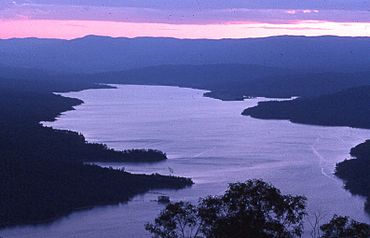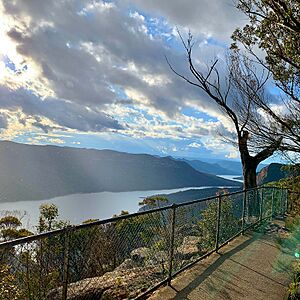Burragorang, New South Wales facts for kids
Quick facts for kids BurragorangNew South Wales |
|
|---|---|

View of the Burragorang Valley
|
|
| LGA(s) | Wollondilly Shire |
| Region | Macarthur |
Burragorang is a special place in New South Wales, Australia. It's often called the Burragorang Valley. You can find it in the Macarthur Region, inside the Wollondilly Shire. This area is famous for Lake Burragorang, a big lake created by the Warragamba Dam. It's also part of the beautiful Blue Mountains National Park, specifically the Nattai National Park.
History of Burragorang Valley
For a very long time, thousands of years ago, the Gandangara people lived in the Burragorang area. They were the original inhabitants of this land. They lived all over the south-east part of New South Wales.
In 1827, a town called Burragorang was started. People began mining for coal there in 1878. For many years, until the 1960s, this area was very important for supplying coal. People also mined for lead and silver in the valley until about 1927.
After World War II, many more people moved to Sydney. Because of this, a big dam called the Warragamba Dam was built. It was constructed between 1948 and 1960 on the Warragamba River. When the dam was finished, it filled up the Burragorang Valley with water, creating Lake Burragorang. This meant that the town of Burragorang and other small towns in the valley were covered by water.
The areas around Burragorang and Nattai had many coal mines. These mines operated from the 1920s to the 1990s. Some of the mines were called Nattai-Bulli, Oakleigh, Wollondilly, Nattai North, and Valley collieries. Experts believe that about 72 million tonnes of coal were dug up from this region. There were also deposits of oil shale here, and some of that was mined too.
The ABC made a TV show called A Drowned Valley. This show shared the memories of people who used to live in the valley before it was flooded.
Exploring Burragorang's Lookouts
The Burragorang Valley has some amazing spots where you can look out over the valley and the lake. These lookouts offer beautiful views of the water and the surrounding nature.
What Does Burragorang Mean?
The name Burragorang comes from the language of the Gandangara people. One idea is that it comes from the word "burro," which means "kangaroo." Another idea is that it comes from "booroon," meaning "small animal." The word "gang" might mean "to hunt." So, Burragorang could mean "place to hunt kangaroo" or "place to hunt small animals." However, some people believe it means "home or place of the giant Kangaroo."
 | Sharif Bey |
 | Hale Woodruff |
 | Richmond Barthé |
 | Purvis Young |


